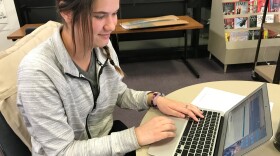Destiny Martinez sits at a small table in the hallway of Murphy Creek, working on reading exercises with three second graders. The 23-year-old is a student teacher at the P-8 school in Aurora.
"I knew like teaching was always something that I wanted to do," Martinez said.
Martinez is Hispanic and said growing up in Denver, she didn't have teachers that looked like her. That's why the senior is part of the early childhood education, or ECE, program at Metropolitan State University of Denver.
"A majority of the kids in that neighborhood were Hispanic," she said. "There weren't really any teachers that really knew anything about us. So, it was kind of hard to connect to them."
College students studying to become teachers must complete several requirements, including a semester of full-time teaching in a classroom. But they don't get paid to teach. For students like Martinez, who work while going to school, this teaching commitment can lead to a big financial burden.
"Many of our students of color, many of our students who have experienced some kind of hardship or come from generational poverty or have any kind of issues financially or struggling financially, have a very hard time completing student teaching," said Dorothy Shapland, an assistant professor of ECE at MSU Denver, which is a Hispanic-Serving Institution.
If education majors don't student teach, they can't get their teaching license. Without it, Shapland said, students may end up working in preschools after graduation where they make a lot less money.
MSU Denver created a new initiative called Prepared to Teach to help students overcome this financial barrier. The program extends the normal one semester of student teaching to a full school year classroom residency. ECE majors teach three or four days a week while finishing their degree. It also provides a financial stipend, so students don't have to work while teaching.

Destiny Martinez and her classmate, Aliah Humphrey, were chosen for the program.
The residency allows them to develop long-term relationships with their mentor teachers, students and parents.
"(ECE) students get to see how a teacher starts the year and builds relationships right off the bat with students, establishes ground rules, establishes routines in the classroom," Shapland said. "All of those things we know are excellent practice."
MSU Denver received $14,000 from Bank Street College in New York City to plan and implement the residency for one year. The university's program is part of Bank Street College's larger, national Prepared to Teach project. Prepared to Teach has been working with educational institutions for four years and is now partnering with dozens of higher education institutions and P-12 school districts nationwide.
One goal is to increase teacher residency programs around the county.
Karen DeMoss is the executive director of Prepared to Teach. A big problem with residencies, she said, is how to fund a full year of free student teaching without grant or philanthropic funding. Using data from these institutions, Bank Street College is figuring out how to make residencies more affordable and accessible as well as studying the financial burdens student teachers face.
Students who are teaching, taking classes and working full-time are not going to learn as much, said DeMoss.
"We know you need to be able to focus if you want to learn," she said. "We need to be able to help future teachers focus while they're learning so they can help out children focus when they're in school."
There's not a lot of data on the success of residency programs. But a report from the Learning Policy Institute, a nonprofit, nonpartisan research group, said they can lead to less teacher turnover and better classroom outcomes. Students of color are also more likely to enroll in a residency than other teacher preparation programs.
Colorado lawmakers also support residencies. The state legislature passed a bill last year allocating more money to expand effective teacher residency programs.
Aliah Humphrey, 23, is also a senior at MSU Denver and a second-grade student teacher at Murphy Creek. She's thinks a full year of classroom experience will make the transition to a real teaching job easier.

Humphrey has been teaching at the school for less than a semester, but said one of her favorite things is building relationships with the kids. She is biracial but identifies as black and said she never had a black teacher until college.
"(Growing up) I didn't have teachers who looked like me," Humphrey said. "So, I want to be that for kids."
Martinez echoes that sentiment. Being one of the only Hispanic teachers at Murphy Creek, she's already connected with some of the Hispanic girls, she said. One student even asks about Martinez when she's not teaching.
"Like 'when is she coming back' kind of thing," she said. "She actually told me that she wanted to be a teacher just the other day. So, I felt just like the connection that you can build with those kids."





